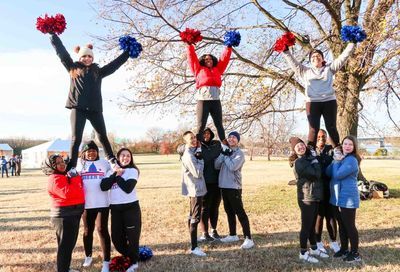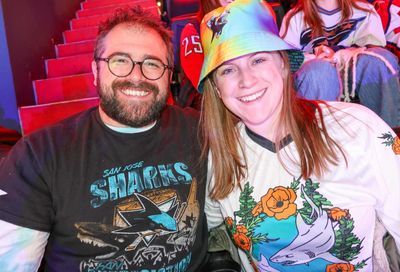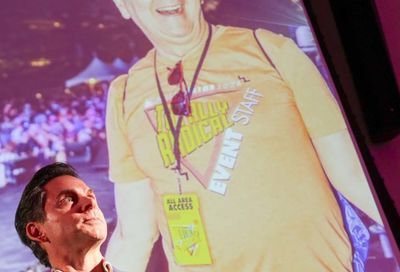The Best and Worst Films of 2024
Film critic André Hereford serves up his best and worst films in an unforgettable year of witches, grannies, and gladiators.

As of this writing, kid-friendly blockbusters Moana 2 and Wicked: Part One top the worldwide box office, while decidedly more grown-up Anora and Emilia Pérez are topping critics’ lists and Oscar predictions. But none of those titles will top, or even touch, this list of the year’s Ten Best Films among the more than 120 releases I watched in 2024.
10. Nickel Boys — Filming entirely in first-person POV, director RaMell Ross, abetted by ace cinematographer Jomo Fray, takes an extraordinary approach to depicting the lives of two ordinary Black boys brought up in a barbaric Florida reform school in the 1960s. Experiencing this world purely through the eyes of teens Elwood (Ethan Herisse) and Turner (Brandon Wilson) could have felt gimmicky, but instead results in a singularly intimate, perceptive drama, based on the Pulitzer-winning novel by Colson Whitehead, and featuring another stellar performance by Aunjanue Ellis-Taylor, as Elwood’s stalwart grandmother, his bastion of love, strength, and defiance on the outside.
9. The Substance — In the bloody vein of darkly comic horror freakouts like Julia Ducournau’s Raw or Gaspar Noé’s Climax, this alternately gruesome and hysterically camp creation from Coralie Forgeat (Revenge) provides the unmistakable filmgoing thrill of “What the hell did I just watch?” Diving down the rabbit hole of our collective, media-fueled obsession with youth and beauty, The Substance also provides seemingly ageless Demi Moore with a meaty, multi-layered role that she rips into with wit and abandon. Moore, co-star Margaret Qualley, and, ultimately, the film carry the outrageous fantasy plot about a cell-replicating miracle drug boldly to its stunning conclusion, assisted by special makeup effects that lend even a monster warmth and tenderness.

8. Thelma — The year’s best comedy is also the most compassionate film about aging you’re likely to see in any year. “Getting old ain’t for sissies,” Bette Davis supposedly said decades ago, and indeed, it takes nerve to get old in this society. But there are rewards to accompany the wrinkles, according to writer-director Josh Margolin’s sublime tribute to his actual grandma Thelma, played here by June Squibb as a feisty, straight-talking 94-year-old action hero. Scammed out of ten grand, this nonagenarian Ethan Hunt hits the streets to track down her money, and finds fresh reserves of resolve she didn’t know she had. She gets by with a little help from her friends, including reluctant road dog Ben, portrayed by Shaft legend Richard Roundtree, leaving us the gift of a finely calibrated final film performance showing that the mightiest trees may bend with time but still stand fast.
7. The People’s Joker — Vera Drew’s audacious, funny multi-media mosaic remixes the Batman villain’s origin story into a radically trans narrative, inspired by the filmmaker’s life, following a queer sketch comedian who finds community among Gotham City’s other wannabe comics, like Poison Ivy and the Penguin, while also discovering her trans identity. After run-ins with Batman, she emerges as Joker the Harlequin, Gotham’s new crime kingpin, portrayed with gusto by Drew, who’s well-complemented by Nathan Faustyn’s surprisingly touching take on the Penguin. The movie’s super-low-budget, DIY seams show, and beautifully so.

6. Challengers — Sexy, sweaty, fast-paced, and mercurial, Luca Guadagnino’s love triangle dramedy bounces, bobs, and weaves like a tennis ball whizzing across the net — channeling that sport via Sayombhu Mukdeeprom’s breathtaking camerawork, the driving techno score by Trent Reznor and Atticus Ross, the bantering script by Justin Kuritzkes, and the intensely connected performances by lead trio Mike Faist, Josh O’Connor, and Zendaya, positively electric serving a fierceness untapped in her previous roles.
5. Dahomey — A mesmerizing account of progress in motion, Mati Diop’s brilliant, brief documentary captures the repatriation of 26 treasured African artifacts, long ago plundered from the Kingdom of Dahomey, making their journey from Paris back to their homeland in present-day Benin. The return of these priceless icons of cultural heritage sparks a tense national debate on art, history, post-colonial identity, and the true intentions behind France’s gesture of reparations. Diop even gives the artifacts a voice in the discourse, turning item number 26 (a statue voiced by Haitian writer Makenzy Orcel) into the film’s sage, snarky narrator musing on his own strange trip home.
4. Hard Truths — It’s clear, long before it happens, in Mike Leigh’s quietly devastating Hard Truths, that the insufferably prickly central character Pansy is bound for a breakthrough. Depressed, fatigued, teeming with rage, and played to blistering perfection by Leigh alum Marianne Jean-Baptiste, Pansy can’t go on blasting hellfire at her overmatched plumber husband and slacker son, her caring sister, and anyone else unlucky enough to cross her path. Even if her tirades often are entertaining to behold, something’s gotta give. And when it does, in an eruption of emotion shared between sisters, rendered beautifully by Jean-Baptiste and co-star Michele Austin, the catharsis is felt on both sides of the screen. Then, as in the real world and most Mike Leigh movies, life goes on. Pansy goes on being herself, aware but unchanged, true to the lifelong challenge of forging ahead while trying to leave the worst bits behind.
3. Conclave — If real-life papal conclaves are nearly as catty, contentious, and rife with corruption as the one portrayed in Edward Berger’s gripping adaptation of the novel by Robert Harris, then the Catholic Church should sell tickets. As a fantasy of what might go on behind sealed Vatican doors, the film expertly juggles a handful of hot-button issues while unfolding a compelling mystery set among fabulous production design, staged and photographed with crisp, color-coded finesse, and impeccably acted by an on-point ensemble. There are no small parts in this glorious company, as proven by Isabella Rossellini, whose all-seeing, often silent Sister Agnes virtually steals the show with one pivotal scene.

2. A Different Man — Writer-director August Schimberg’s squirrelly, smart-ass dark comedy successfully pulls the same trick on the audience that it plays on its facially disfigured hero, Edward, who believes his quietly miserable existence will be drastically made over by an experimental surgery that transforms him into a handsome guy next door. Of course, Edward’s physical transformation doesn’t deliver happiness just like that, but neither he, nor we, could predict exactly how cruelly counterproductive his make-over will turn out to be once he meets Oswald, a man also facially disfigured, yet possessed of many finer qualities Edward lacks. As Oswald, Adam Pearson gives the definition of an Outstanding Supporting Actor performance opposite Sebastian Stan’s masterful turn as poor, deluded Edward spiraling out of his mind in stark, sometimes gross, occasionally hilarious fashion.
1. The Brutalist — Every once in a while, Adrien Brody shows up to remind us he’s one of the most gifted actors working, as he does portraying visionary architect László Toth in writer-director Brady Corbet’s astounding epic drama. Brody bares moving depths of humanity, transmitting the truth in László’s fictional reality, as a Hungarian Jew in 1947 who barely survived the war in Europe and now seeks to build something lasting in America. That takes ingenuity and inspiration, which flow through László in abundance, and balls of steel, which he’s also got. He’ll need piles of money, too, which he doesn’t have, but finds in brusque benefactor Harrison Van Buren, played by Guy Pearce in a diabolically complex performance emphasizing the delicate give-and-take between art and commerce that almost never favors the artist, yet sometimes produces true wonders — like this gorgeous movie.

Plus ten more that were well worth the time: Sing Sing; All We Imagine As Light; A Quiet Place: Day One; I’m Still Here; Lie with Me; The Piano Lesson; Flow; Longlegs; The Sixth; Problemista.
Usually, out of respect for the fact that nobody sets out to make a bad film, we don’t also go the extra step of publishing a “Worst” list. But this year, several special achievements in bad moviemaking warranted — nay, demanded — recognition, so here are the Five Worst Films of the Year:
5. Back to Black — One can imagine Amy Winehouse outright hating this lazily reverse-engineered biopic, and feeling pity for lead Marisa Abela, trying her damndest but not approximating the killer vibe of Amy’s voice and music.
4. Kraven the Hunter — Apparently, badly-dubbed scenes of dialogue plastered over shots of actors who obviously aren’t talking is a feature, not a bug, in Sony’s Spider-Man villain spinoffs, like this one, which just keeps spitting out origin stories for characters who have nothing to actually do.

3. Jackpot! — Grimly cynical and not funny enough to make that work, this Awkwafina-starring fantasy-comedy, imagining a 24-hour window where anybody can usurp a lottery winner’s cash prize by simply killing them, takes every opportunity to swing low blows, wasting the charms of co-star John Cena in the process.
2. Argylle — Apart from the crime of making Henry Cavill, in a hideous flattop brush cut and velvet suit, look like some rizz-less creep when he’s supposed to be a suave international agent, this spy comedy from director Matthew Vaughn could not judge the line between camp and cringe. A slightly better judge, Cavill, in an interview, had the good sense not to take the blame for the hair: “Matthew said, ‘Look, this guy’s going to have a particular look and you’ve got to trust me.’ And I did! That’s the kind of thing I was looking for. I’m glad I did it.” At least he is.
1. Madame Web — Should we ever get another volume of the deliciously snarky book Bad Movies We Love by Stephen Rebello and the late Edward Margulies, Madame Web has earned its chapter among the deadpan funny flops of all time, if for nothing other than star Dakota Johnson who appears distinctly aware in every single shot of how bad this movie is as if she somehow were trapped inside it. It’s a marvel, alright.
Support Metro Weekly’s Journalism
These are challenging times for news organizations. And yet it’s crucial we stay active and provide vital resources and information to both our local readers and the world. So won’t you please take a moment and consider supporting Metro Weekly with a membership? For as little as $5 a month, you can help ensure Metro Weekly magazine and MetroWeekly.com remain free, viable resources as we provide the best, most diverse, culturally-resonant LGBTQ coverage in both the D.C. region and around the world. Memberships come with exclusive perks and discounts, your own personal digital delivery of each week’s magazine (and an archive), access to our Member's Lounge when it launches this fall, and exclusive members-only items like Metro Weekly Membership Mugs and Tote Bags! Check out all our membership levels here and please join us today!


























You must be logged in to post a comment.